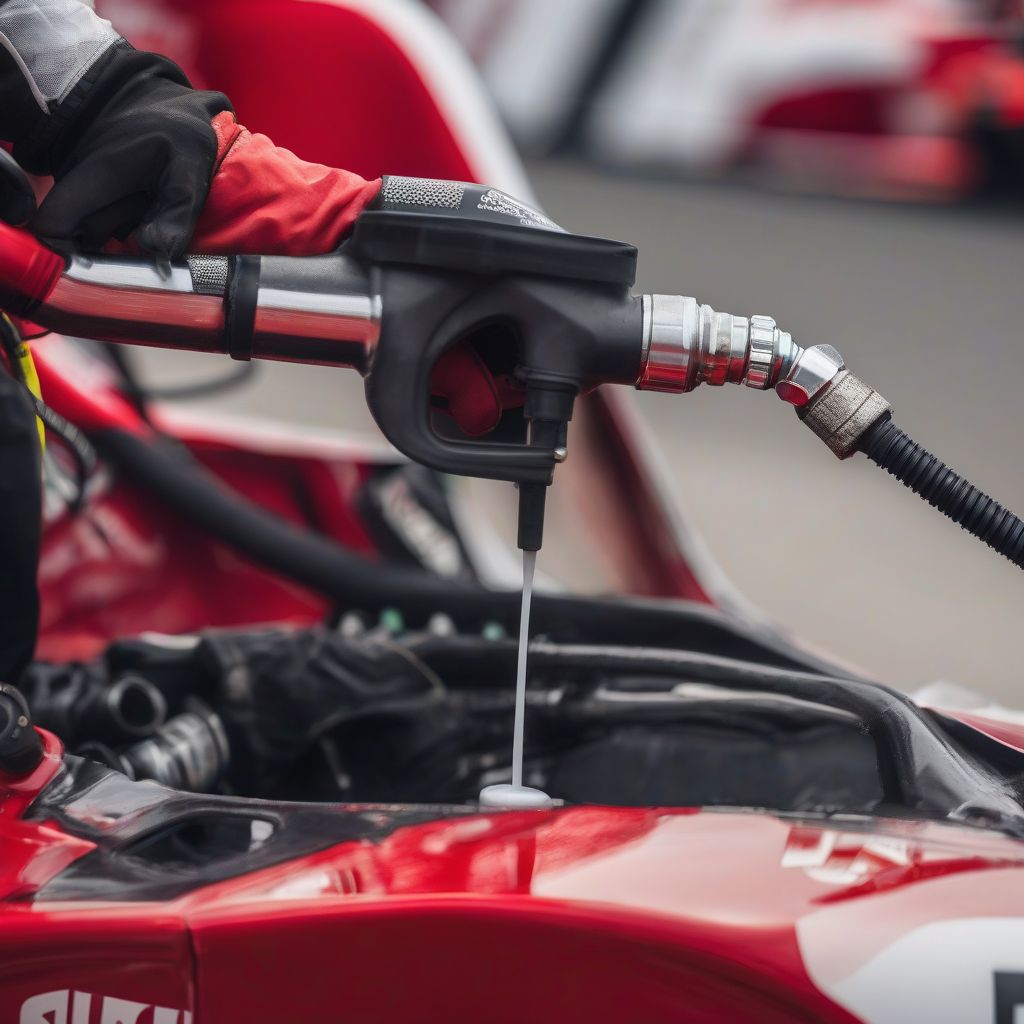Understanding Race Gas Cost: A Deep Dive into High-Performance Fuel
The roar of the engine, the smell of burning rubber, and the thrill of speed – motorsports ignite a passion for performance in both drivers and spectators. Behind these powerful machines, however, lies a complex world of engineering and fuel optimization, where “Race Gas Cost” becomes a crucial factor. This article delves into the realm of race gas, exploring its composition, cost drivers, and significance in maximizing engine performance.
What Makes Race Gas Different? A Look at Octane and Performance
Race gas, unlike regular pump gas, is specifically formulated for high-performance engines found in racing vehicles. The key differentiator? Octane rating. This number represents the fuel’s resistance to knocking or detonation – a premature combustion that can severely damage an engine.
Higher octane allows for greater compression ratios in engines, leading to increased power output. Race gas boasts significantly higher octane levels (often exceeding 100) compared to regular gas (typically 87-93). This higher octane tolerance empowers racing engines to operate under extreme conditions, maximizing their performance potential.
Unveiling the Factors Behind Race Gas Cost
Why does race gas cost more than its regular counterpart? The answer lies in its specialized production process and stringent quality controls.
- High-Purity Components: Race gas utilizes high-purity base fuels with minimal impurities, ensuring consistent combustion characteristics.
- Tailored Additives: Unlike regular gas, race gas incorporates performance-enhancing additives like oxygenates and anti-knock agents, further boosting its octane rating and combustion efficiency.
- Stringent Testing and Certification: Every batch of race gas undergoes rigorous testing to meet strict quality standards, ensuring optimal performance and engine protection under racing conditions.
These factors contribute to a higher production cost, directly impacting the price at the pump.
gas.areview.net/wp-content/uploads/2024/09/race-car-fueling-66e009.jpg" alt="Race car fueling" width="1024" height="1024">Race car fueling
Deciphering the Price Tag: Factors Influencing Race Gas Cost
Several factors influence the final cost of race gas, often leading to significant price variations:
- Octane Rating: As a primary driver, higher octane levels directly correlate to higher costs due to the specialized refining and additive packages required.
- Fuel Type: Leaded and unleaded race gas options cater to different engine specifications, impacting price points based on their formulations.
- Supplier and Location: Geographic location, transportation costs, and supplier pricing strategies play a role in determining final retail prices.
- Market Demand and Supply: Like any commodity, fluctuations in supply and demand dynamics within the racing community influence race gas price volatility.
Race Gas vs. Pump Gas: A Cost-Benefit Analysis for Everyday Driving
While the allure of high-performance fuel is undeniable, using race gas in a standard road car is generally unnecessary and economically impractical. Regular vehicles are designed to operate efficiently on pump gas, making the use of expensive race gas redundant.
Moreover, using race gas in an engine not calibrated for it can lead to performance issues and potential engine damage. Consult your vehicle manufacturer’s recommendations for the appropriate fuel type to ensure optimal performance and longevity.
Beyond the Price: The Importance of Choosing the Right Fuel
Selecting the appropriate race gas for a specific racing application is crucial, as it directly impacts engine performance, reliability, and safety. Factors to consider include:
- Engine Specifications: Compression ratio, forced induction systems (turbochargers or superchargers), and ignition timing influence the required octane rating.
- Racing Discipline: Different racing disciplines like drag racing, circuit racing, or rally racing place varying demands on fuel performance, requiring specific formulations.
- Sanctioning Body Regulations: Motorsports organizations often impose strict fuel regulations, including permissible fuel types and octane limits, to ensure fair competition.
Consulting with experienced engine builders or race fuel specialists is highly recommended to determine the optimal fuel choice for a given racing setup.
Conclusion: Fueling Performance in the World of Motorsports
Race gas, with its specialized formulation and high octane rating, plays a pivotal role in unlocking the full potential of high-performance racing engines. Understanding the factors influencing its cost and the importance of choosing the right fuel type is crucial for both drivers and enthusiasts in the world of motorsports. While the price tag may be higher than regular pump gas, the performance gains and engine protection it offers are paramount in the pursuit of racing excellence.
